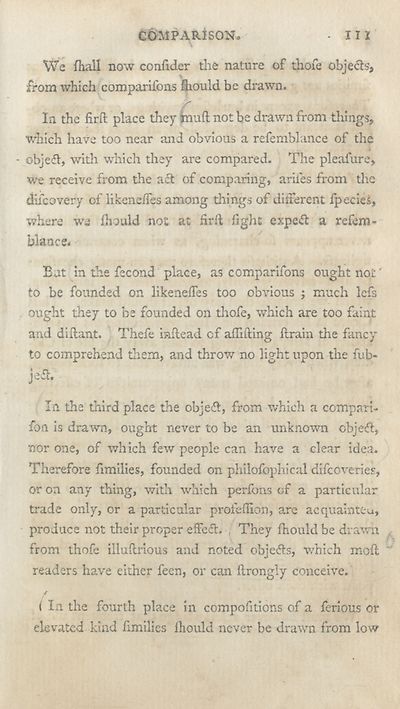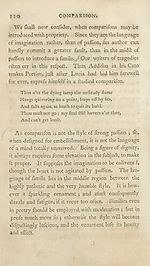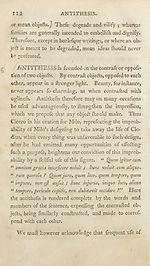Download files
Complete book:
Individual page:
Thumbnail gallery: Grid view | List view

C&MPARiSON.
II
We fliall now confuler die nature of thofe objects,
from which comparifons 5iould be drawn.
In the firft place they (nud not be drawn from things,
which have too near and obvious a refemblance of the
- objedt, with which they are compared. The pleafure,
we receive from the a£t of comparing, arifes from the
diicovery of likendfes among things of different Ipeciei,
where we fhould not at firft fight expedt a refem¬
blance.
Bat in the fecond place, as comparifons ought not
to be founded on likeneffes too obvious ; much lefs
ought they to be founded on thofe, which are too faint
and diftant. Thefe raftead of affifting ftrain the fancy
to comprehend them, and throw no light upon the fub-
jeft.
In the third place the objedt, from which a compari-
fon is drawn, ought never to be an unknown objedt,
nor one, of which few people can have a clear idea.
Therefore fimilies, founded on philofophical difcoveries,
or on any thing, with which perfons of a particular
trade only, or a particular profeflion, are acquaintfcu,
produce not their proper effedt. They ftiould be drawn
from thofe illuftrious and noted objedts, which moft
readers have either feen, or can ftrongly conceive.
( In the fourth place in compofitions of a ferious or
elevated kind fimilies fhould never be drawn from low
II
We fliall now confuler die nature of thofe objects,
from which comparifons 5iould be drawn.
In the firft place they (nud not be drawn from things,
which have too near and obvious a refemblance of the
- objedt, with which they are compared. The pleafure,
we receive from the a£t of comparing, arifes from the
diicovery of likendfes among things of different Ipeciei,
where we fhould not at firft fight expedt a refem¬
blance.
Bat in the fecond place, as comparifons ought not
to be founded on likeneffes too obvious ; much lefs
ought they to be founded on thofe, which are too faint
and diftant. Thefe raftead of affifting ftrain the fancy
to comprehend them, and throw no light upon the fub-
jeft.
In the third place the objedt, from which a compari-
fon is drawn, ought never to be an unknown objedt,
nor one, of which few people can have a clear idea.
Therefore fimilies, founded on philofophical difcoveries,
or on any thing, with which perfons of a particular
trade only, or a particular profeflion, are acquaintfcu,
produce not their proper effedt. They ftiould be drawn
from thofe illuftrious and noted objedts, which moft
readers have either feen, or can ftrongly conceive.
( In the fourth place in compofitions of a ferious or
elevated kind fimilies fhould never be drawn from low
Set display mode to:
![]() Universal Viewer |
Universal Viewer | ![]() Mirador |
Large image | Transcription
Mirador |
Large image | Transcription
| Antiquarian books of Scotland > Languages & literature > Abridgement of lectures on rhetoric > (127) |
|---|
| Permanent URL | https://digital.nls.uk/135467978 |
|---|
| Description | Thousands of printed books from the Antiquarian Books of Scotland collection which dates from 1641 to the 1980s. The collection consists of 14,800 books which were published in Scotland or have a Scottish connection, e.g. through the author, printer or owner. Subjects covered include sport, education, diseases, adventure, occupations, Jacobites, politics and religion. Among the 29 languages represented are English, Gaelic, Italian, French, Russian and Swedish. |
|---|

